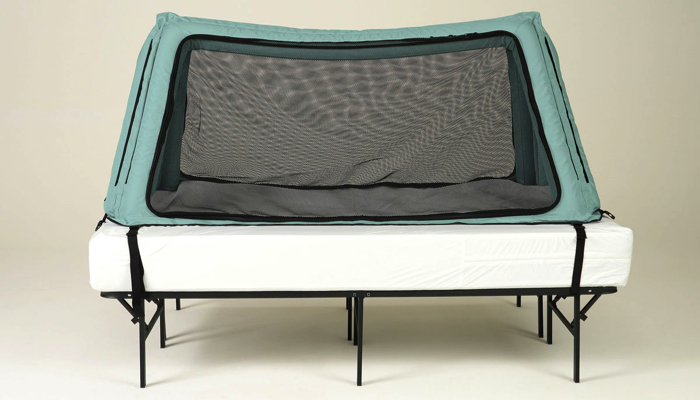Why Is My Baby Fighting Sleep?

- Babies can fight sleep due to being both under and overtired. Don’t attempt to keep your baby up later to solve the problem.
- How much sleep a baby needs changes quickly as they grow. Keep an eye on it to ensure your baby is getting the right amount.
- Bedtime routines, sleep schedules, avoiding overstimulation, and creating a comfortable sleeping environment can all contribute to making sure your baby doesn’t fight sleep.
Baby sleep is incredible. Not only does it keep everyone rested and happy, but it also plays an essential role in your baby’s brain development. One million synapses are formed per second, memories are stored, and learning is consolidated. Sleep has even been found to influence growth, and sleepier babies will grow taller.
All this might leave you wondering, ‘If it’s so great, why is my baby fighting sleep?’
Why Is My Baby Fighting Sleep?
All babies are different, so there are quite a few reasons your baby might resist bedtime and naps. Figuring out the culprit is the first step in helping your baby sleep.
They’re Overtired
It may seem counterintuitive but being overtired is one of the most common reasons babies fight sleep. Typically your baby’s cortisol levels will peak after waking and decrease throughout the day, preparing them for a nice, settled night.
Poor quality or fragmented sleep results in higher cortisol levels, making it harder for your baby to fall asleep. If your baby’s nap has been disrupted by a busy day or they’ve been woken early, they may struggle to sleep later.
You can spot an overtired baby by looking out for the following signs:
- Fussiness
- Crying
- Ear tugging
- Looking Away and avoiding eye contact
- Rubbing eyes
- Crossing eyes
- Clumsiness
- Yawning
They’re Not Tired Enough
When you first bring your newborn home, they’ll seem to do nothing but sleep, day and night, and once you find a routine that works you’ll want to stick with it. Your baby however has other plans, as they develop at lightning speed so do their sleep patterns.
As you can see in the table from the American Thoracic Society below, your baby may drop 5 hours of sleep time in just 4 weeks. If you’ve tried to stick to your original routine, you may find that your baby just isn’t tired enough when it’s bedtime or time for a nap.
| Age | Recommended amount of sleep per 24 hours |
| Newborn – 1 month | 16 to 20 hours |
| 1 – 4 months | 15 to 17 hours |
| 4 – 12 | 12 to 16 hours |
| 12 – 24 months | 11 to 14 hours |
They’re Overstimulated
Just like most adults, an overstimulated baby can have difficulty falling asleep. Of course, it’s not coffee and smartphones to blame but the following activities:
- Noisy Toys
- Screens
- Cuddles with lots of visitors
- Exciting Play
- Too much noise
Your baby will show you they’ve had enough by turning away, yawning, fussing, or crying. If they become very overstimulated, you might also notice them making jerky movements, covering their eyes and face, becoming tense or freezing up, and having a glazed expression or frown.
They Are Experiencing Separation Anxiety
Sometime around 6 or 7 months old, your baby will begin to understand that they are their own person, separate from you. Unfortunately, this comes with the realization that you can leave and the anxiety that you might not come back.
Separation Anxiety can wreak havoc on nap time, cause bedtime resistance, and make your baby fight sleep as they’ll be scared to be left in their crib alone.
Their Sleep Environment is Disruptive
If your baby won’t sleep, it may be their sleep environment that’s to blame. Newborn babies will fall asleep almost anywhere but, as they grow they’ll become more aware of the world around them. Distractions, lights, and noises will all contribute to your baby fighting sleep.
The room where your baby sleeps should be dark, quiet, and at a safe and comfortable temperature. You should also check there’s nothing itchy in their clothes, like tags or stitching, which could be keeping them awake.
They’re Struggling With Teething, Wind, Reflux, or Allergies
Sometimes, it’s a medical condition that’s the culprit. Teething, wind, reflux, and allergies can all be uncomfortable or painful and will make your baby fight sleep.
If you suspect any of the following conditions are disrupting your baby’s sleep, talk to your child’s pediatrician or health care provider. They may be able to diagnose the issue and offer help and support.
| Condition | Signs to Look Out For |
| Teething |
|
| Wind |
|
| Reflux |
|
| Allergies and Intolerances |
|

How Can I Get My Baby to Stop Fighting Sleep?
Now we know why babies fight sleep, let’s look at what can be done about it.
Find a Sleep Schedule That Works
If your baby fights sleep and you want them to be able to get to sleep without being held, a sleep schedule is the first thing to get right. An under-tired baby is just as tricky to get to sleep as an overtired one, so making sure they have the right amount of sleep at the right time is key to preventing them from fighting sleep.
There are lots of different schedules available, but what works will differ according to your lifestyle and your baby’s temperament. To create your own nap schedule, make a note of your baby’s wake-up time and watch for their cues that they’re getting sleepy. Experiment for a few days, and you’ll soon learn the ideal wake time before the next nap.
Of course, establishing a nap routine is a task you’ll have to repeat again and again as your baby grows. A newborn will only need around 40mins of awake time before their next nap. By 4 months, they could be up to 90 mins, and a 6-month-old could last over two hours. The American Academy of Pediatrics recommends the following wake times as a guide.
- 0 to 4 months: less than 45–60 minutes
- 4 to 6 months: 1-2 hours
- 6 to12 months: 2-3 hours
- 12 to 18 months: 3-4 hours
- 18 months to 2 years: 4 – 6 hours
Learn Your Baby’s Sleep Cues
When your baby is overtired they’re likely to fight sleep and have short naps. Avoid this by learning the signs they’re tired and need some shut-eye.
Most babies have similar sleep cues, which include:
- Yawning
- Looking Away
- Eye rubbing
- Fussiness
- Younger babies may have jerky movements or clench their fists
- An older baby will become quiet and won’t want to play
Your baby may even have a few special cues of their own. As soon as you notice any of these signs, get your baby down for their first nap.
Avoid Overstimulation
Some of the causes of overstimulation are easy to avoid, like noisy toys, screens, and exciting play. Others are a little trickier. New moms have lots of visitors, and it’s normal for the whole family to want to take turns snuggling the baby.
For some babies, this is no big deal, but others will be overwhelmed by all of the unfamiliar cuddles. Keep visitors to a couple at a time, and try to avoid snuggles with others when your baby is tired or it’s near bedtime.
Help Your Baby Feel Secure
Separation anxiety can make older babies fight sleep as they won’t want to be left alone in their crib. Fortunately, there are lots of different sleep training methods that’ve been developed to help.
One option is the Ferber Method or graduated extinction. It requires you to return to your baby at intervals to reassure them that you’re still nearby. The trick is that the length of time between each visit gets longer at each interval.
If you don’t like the idea of leaving your baby to cry, the Chair Method may be the sleep solution for you. Unlike other methods, you stay in the room, sitting on a chair, the whole time. Each day you move the chair slightly further away until eventually you’re outside the door and your child can fall asleep by themself.
For babies who get themselves so worked up they need the reassurance of a little cuddle, the Pick Up Put Down Method is great.
Whichever sleep training method you choose, pick a time when you’re not too busy and there and no big changes in your child’s life. It might take a few days to start working, but once it does, your baby could start napping for longer periods. They may even sleep through the night!

Create a Soothing Sleep Environment
Help your baby sleep by providing a familiar sleeping environment with no noises or distractions.
White Noise – A noise machine or app on your phone will help your baby fall asleep, by simulating the sounds of the womb, and stay asleep, by blocking out any loud noises from outside.
Blackout Curtains – Blocking out light will help coordinate your baby’s circadian rhythm and signal that it’s time for sleep.
A Quiet Room – Try to put your baby down for their naps in a quiet room, away from noisy toddlers and other interesting distractions.
Their Own Bed – Being placed in their own safe, and familiar bed will act as a sleep cue.
Comfortable Temperature – Your baby’s room should be cool to prevent them from overheating.
Bedtime Routine – Follow the same bedtime routine each evening to help your baby stop fighting sleep. This could include a bath, massage, story, or lullaby. It’s up to you. Just make sure you do the same things in the same order every night.
Make Your Baby Comfortable
If discomfort is the reason your baby fights sleep or tries to skip their morning nap, there are lots of solutions that could help.
Teething pain can be soothed with teethers and gels. If they have a temperature or ear infection, some pain-relieving medications may also help, but talk to a medical professional first.
Wind can be reduced by trying different feeding positions, different bottles, or burping frequently.
A medical issue, like reflux or allergies, can be diagnosed and resolved by your baby’s doctor.
FAQs
How Do You Get an Overtired Baby to Fall Asleep?
If your baby becomes overtired, they’ll probably need more help falling asleep than usual. Swaddling, white noise, lullabies, darkness, and rocking will help calm your baby if they’re having trouble settling. Take care only to use rocking as a last resort, though. If they get too used to it, you’ll create more sleep problems as they won’t learn to self-soothe.
How Do You Get an Overstimulated Baby to Fall Asleep?
Getting an overstimulated baby to sleep can be slightly different as singing and rocking can provide even more stimulation. Instead, try wearing your baby, taking them into a dark room, or for a walk in nature. Sucking could also help calm them, bring their hand to their mouth, or give them a pacifier, and they might just drift off.
Why Does My Toddler Fight Sleep?
It’s not just babies that fight sleep. Toddlers can also resist bedtime and have trouble sleeping. Separation anxiety, overstimulation, overtiredness, allergies, hunger, and sickness can result in bedtime tantrums. Developing good sleep habits like a bedtime routine, limited screen times, a healthy diet, and remaining calm during these nighttime struggles can help your child sleep.

Related Posts

Sleep, Special Needs
Safe Place Bedding Travel Bed Review
Traveling with a special needs child can be stressful! Having a safe, durable, and easy to use travel bed can make traveling so much easier!

Sleep, Special Needs
Sleep Regimen for Premature Babies: Special Considerations
It can take premature babies much longer than their full-term peers to sleep for long stretches. A preemie sleep schedule may encourage better sleep.

Sleep
Mastering the Bedtime Routine: 3 Tips for a Peaceful Night’s Sleep
From around six weeks, a newborn bedtime routine can help your baby learn the difference between day and night and prepare for a restful night’s sleep.